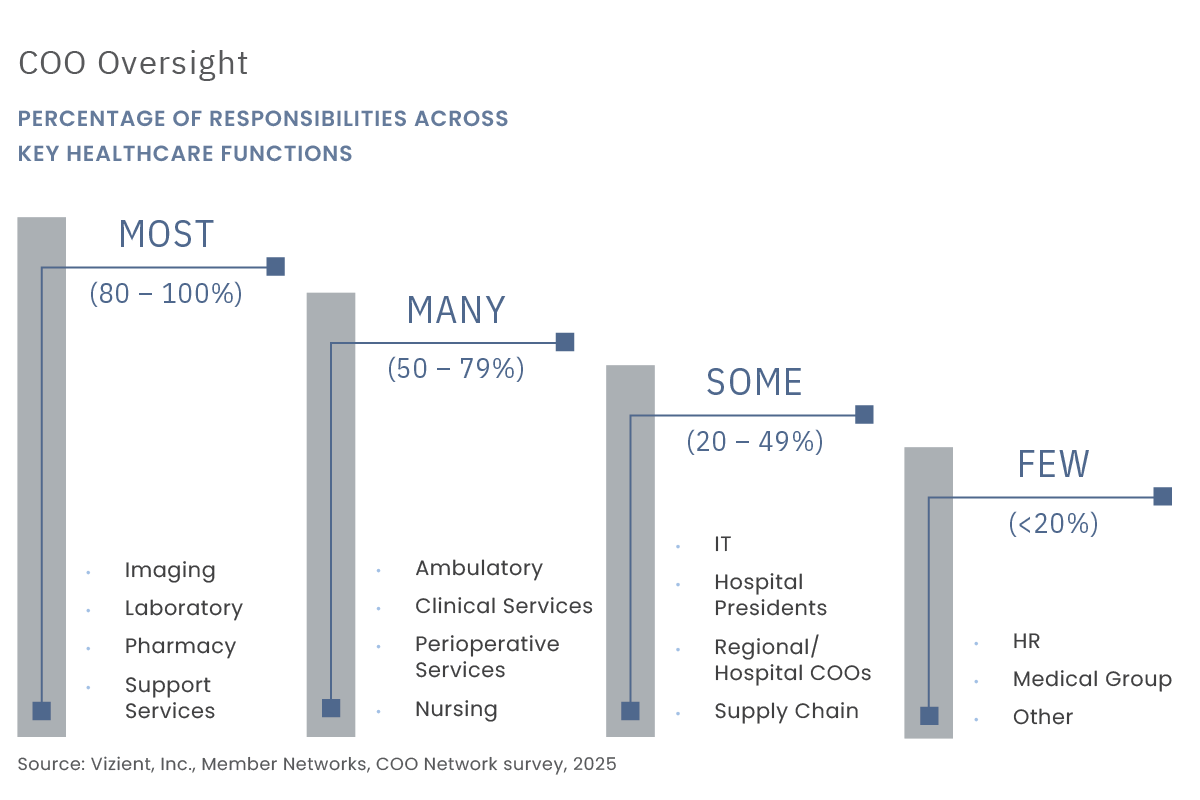In the intricate landscape of modern healthcare, the Chief Operating Officer (COO) is a pivotal leadership role. Charged with managing day-to-day operations while advancing enterprise-level initiatives, COOs are essential in ensuring healthcare organizations function smoothly, efficiently, and effectively.
Yet, the COO role is often the least clearly defined job in the C-suite. Unlike CEOs, whose responsibilities are publicly visible, or CHROs and CFOs, whose domain-specific expertise anchors their remit, the COO’s responsibilities often defy easy categorization. These responsibilities vary not only by organization but also by strategic needs, the CEO’s preference and style, the organizational structure, and the market context. This adaptability to meet the needs of the moment makes the role particularly challenging to fully capture or define.
Such ambiguity, however, underscores the importance of the COO role. While Nathan Bennett’s and Stephen A. Miles’s seminal work Riding Shotgun: The Role of the COO established a broad framework for understanding the COO position across industries, healthcare presents unique challenges that contextualize this critical leadership role. Our analysis builds upon Bennett’s and Miles’s foundation by examining how healthcare COOs navigate the distinctive complexities of clinical integration, regulatory compliance, and care delivery transformation.
Our research shows that the present-day healthcare COO is a multidimensional leader whose impact resonates through every aspect of the enterprise. In this report, we explore how the COO role is evolving to address the dynamic needs of healthcare organizations and discuss current challenges, future trends, and skills required for future-ready COOs. We seek to decode the COO’s job by identifying key facets of the role that are consistent across COOs and those that vary by context, providing a framework to better understand it. The report also sheds light on the experiences and behaviors that differentiate the most impactful COOs, enabling them to navigate the complexities of the evolving healthcare landscape masterfully.
RESEARCH METHODOLOGY
In partnership with Vizient, Inc., and drawing on insights from their well-established Member Networks COO Network, the WittKieffer team conducted a survey on the COO role and facilitated discussions with its members. Additionally, we leveraged our extensive experience partnering with healthcare organizations and held in-depth interviews with healthcare COOs and CEOs. This comprehensive research allows us to present a leadership blueprint that pinpoints the foundational elements of modern COO leadership and offers practical recommendations for COOs and CEOs steering the future of care delivery.
Navigating the Evolving Role of the Healthcare COO
Impactful healthcare COOs exert far-reaching influence through the decisions they make and the behaviors they model daily. Leadership at the COO level is less about command and more about embodiment: creating a culture of discipline, resilience, and forward momentum by showing up consistently and authentically across the organization. The COO’s presence is often less visible to the public but more deeply felt throughout the enterprise, especially in how priorities are operationalized, how teams engage with change, and how trust is cultivated across functions and entities. As we delve into the complexities of the COO role, it is essential to understand the current challenges and emerging trends that shape this dynamic position.
MEETING THE MOMENT: Current COO Challenges
The role of the healthcare COO is fraught with unique challenges, particularly in achieving role clarity and managing relationship dynamics. To be successful, COOs need to align with the CEO on role design and maintain clear decision-making boundaries with other members of the top leadership team. Navigating relationships within the organization requires not only building and fostering trust with the CEO and senior management but also establishing appropriate visibility with the board — all vital for effective collaboration and organizational alignment.
Additionally, many COOs are preparing for future leadership opportunities, often with a goal of becoming CEO. Balancing present performance, career advancement, and personal ambition requires a delicate mix of drive and humility, ensuring they are ready to lead impactfully today and in the future.
As of today, we have identified five critical challenges that define the modern healthcare COO mandate, reflecting the many-sided nature of the contemporary COO role and requiring leaders who can simultaneously manage financial constraints while aligning strategic vision and operational execution.
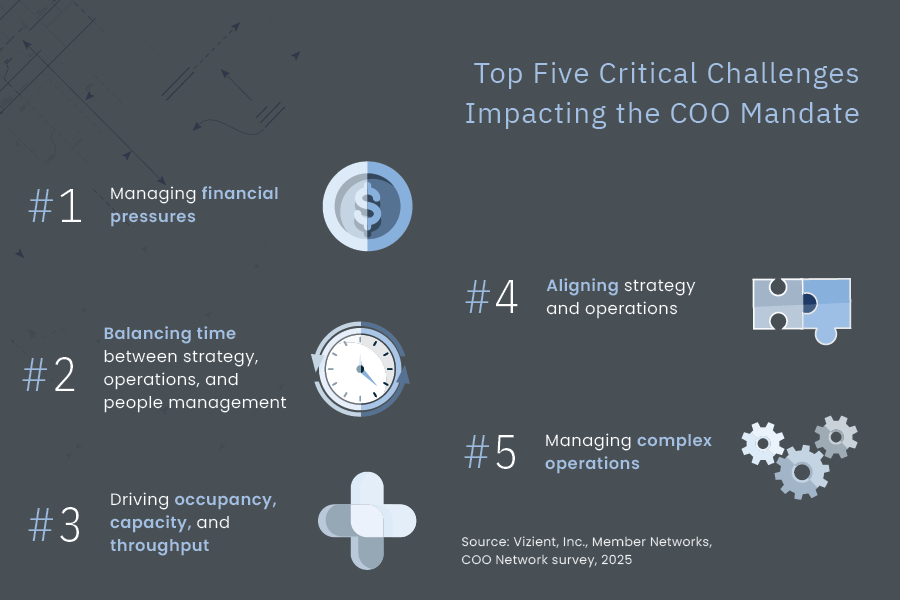
The dynamic nature of healthcare today increases the complexity and change in the COO role. Over the past three years, 80% of COOs have reported a significant increase in responsibilities. This expansion is most prominent in the areas of collaboration with a wider range of constituents and leaders, and the identification of growth opportunities and/or revenue generation. Additionally, COOs are taking on more talent-related responsibilities, such as development, engagement, and culture, as well as increased focus on community engagement, partnerships, and AI/technology implementation. This growing scope of responsibilities is mirrored by an increase in team size and breadth. Over 63% of COOs have seen an increase in the number of direct reports, with the majority overseeing five to ten functions. These functions commonly include imaging, laboratory, pharmacy, and support services, with many COOs also managing ambulatory, clinical services, perioperative services, and nursing.
ADAPTING TO TOMORROW: Future-Ready Healthcare COOs
While the scope and complexity of the COO role continue to expand, not all its core requirements are new. The ability to drive execution with precision and purpose, foster cross-functional collaboration, and lead large teams through high-stakes environments has always defined exceptional operations leadership. However, a growing set of experiences and skills distinguishes COOs who are prepared not just for today’s challenges, but for tomorrow’s transformation.
COO Looking ahead, healthcare COOs must excel in the following critical areas:
LEVERAGING TECHNOLOGY AND AI. Among the most outstanding differentiators of future-ready COOs is the ability to use technology and AI to enhance operations and the patient experience. Digital fluency has become essential for operational leadership, moving beyond the domain of IT alone. COOs are expected to champion technology-enabled innovation — applying predictive analytics to improve throughput, using AI to optimize workforce deployment, and leading digital front-door initiatives that streamline patient access and engagement.
CREATING CLARITY AMID CHAOS. Equally essential is the ability to create clarity amid chaos — to articulate a coherent operational vision that both anchors teams and shows them the way forward, even as external pressures mount. This skill will become even more important as challenges grow more complex and the pace of change accelerates. In a fragmented, ever-changing environment, future-ready COOs must balance short-term demands with long-range thinking, helping teams see beyond the day-to-day noise and reinforcing focus and purpose even when the path forward is uncertain.
RECOGNIZING CROSS-INDUSTRY PATTERNS. Future-ready COOs bring insights and lessons from other sectors, such as retail, logistics, hospitality, or technology, into the context of healthcare. They recognize that patient expectations have been reshaped by consumer experiences elsewhere and are adept at bringing in new thinking without abandoning the rigor required in care delivery.
LEADING ACROSS DISTRIBUTED ENVIRONMENTS. Finally, future-ready COOs excel in leading across distributed environments — guiding multi-site operations with a combination of local responsiveness and system-wide coherence. Their leadership extends beyond traditional management hierarchies, relying on influence, collaboration, and shared accountability with physicians and clinical leaders. Engaging clinical peers as partners, not just constituents, has become a defining skill for COOs navigating care transformation in matrixed, team-based environments.
Given the dynamic nature of healthcare, the COO’s ability to adapt and lead with operational rigor and relationship agility will be more important than ever. This will ensure that COOs can respond to emerging trends while maintaining a focus on operational excellence and implementing change.
Practical Recommendations for COOs (and Their CEOs)
Healthcare COOs operate from the middle, with an expansive reach across the enterprise, and they are uniquely positioned to translate vision into results. Achieving this requires more than tactical excellence — it calls for a deliberate recalibration of how COOs guide and prepare their organizations for a future that looks markedly different from the past.
Healthcare COOs need to lead at a moment of inflection, where operational expertise must be matched with emotional intelligence, future readiness, and overarching organizational perspective. The most impactful leaders will be those who not only manage complexity but shape coherence — consistently, credibly, and collaboratively.
For COO-CEO partnerships to thrive, we recommend the following:
BUILD JOB CLARITY.
Alignment between the CEO and COO is fundamental to the success of both leaders and of the organization as a whole. With so much variation and change in the COO role, it is important for CEOs to clarify what type of COO they need. It is important to consider the COOÕs strengths and developmental areas, the CEO’s preferences, the executive team composition, and organizational strategy and context to ensure clarity in role responsibilities and expectations.
EXPAND THE COO’s IMPACT.
While technical expertise in operations remains foundational, COOs must increasingly operate as system integrators. CEOs should encourage COOs to step beyond departmental silos and develop a deep understanding of enterprise-wide priorities, from finance and long-term planning to community partnerships and digital transformation.
STRENGTHEN PEOPLE SKILLS.
The modern healthcare COO is much more people-focused than ever before, emphasizing empathy, active listening, and motivating teams through passionate communication of vision. Building and maintaining strong relationships to create alignment and cultivate purpose is essential. As the pressure to perform intensifies, the risk of mission drift increases. The most respected COOs keep patient-centered care and workforce wellbeing at the heart of operational decisions — even when trade-offs are required.
CONSIDER THE COO’s NEXT STEP.
For some, the COO role is a stepping stone to CEO; for others, it is the destination. Regardless, it is important to consider the COO’s career goals and how their current role sets the stage for future success. where strategy and operations intersect. The key is to be at that collision point, ensuring we execute strategy thoughtfully and with careful planning.
A Comprehensive Lens: Understanding the COO Role
Defining the multifaceted nature of the COO position requires a nuanced understanding of expectations and realities. To address this complexity, we crafted a comprehensive framework designed to provide a clear lens through which COOs can navigate the intricacies of today’s healthcare environment. This structured approach offers actionable insights, empowering COOs to excel in their roles and drive organizational success.

In our framework, the COO’s role is fundamentally defined by two essential facets that are indispensable and at the forefront of their responsibilities. These two facets are the interconnected gears that are core to any healthcare COO role: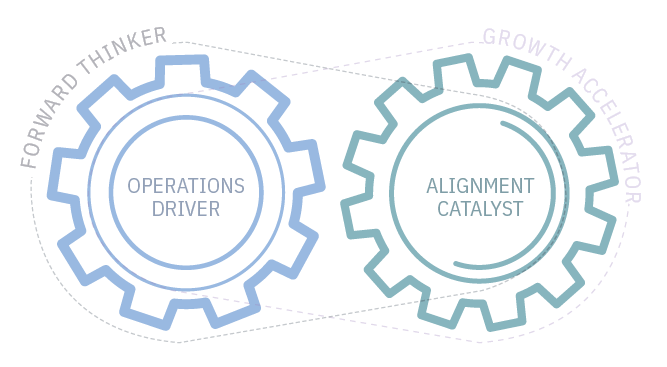
OPERATIONS DRIVER: COOs in this capacity focus on optimizing clinical and administrative performance, enhancing efficiency, and standardizing protocols to ensure high-quality patient care. They are adept at integrating care operations, staffing models, and financial performance to create a cohesive healthcare delivery system.
ALIGNMENT CATALYST: To improve performance, COOs must create alignment. This aspect of the role fosters a unified culture, drives change management, and facilitates cross-functional partnerships. It requires relational intelligence and enterprise fluency, enabling COOs to harmonize performance goals and build high-performing teams.
The other two facets (the belts around the core gears) are optional: they may or may not be part of the healthcare COO role. Instead, one or both of these facets may be incorporated, depending on the CEO’s long-term vision and the organization’s needs:
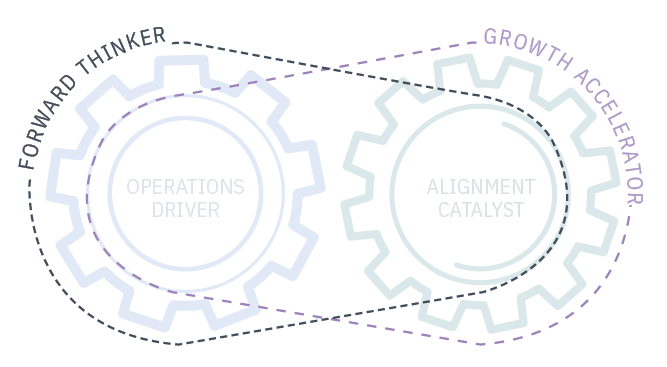
FORWARD THINKER: In this capacity, COOs proactively identify emerging challenges and opportunities, spearhead digital transformation initiatives, and conduct scenario planning. They fortify the organization’s preparedness for regulatory changes and evolving patient needs, thereby enhancing its competitive position.
GROWTH ACCELERATOR: This aspect of the role entails expanding market reach, broadening patient coverage, enhancing service offerings, and driving growth in local and national markets. In this capacity, COOs identify growth opportunities and foster innovation and expansion — leading to revenue growth and a larger operational scale.
Now, we will detail each component of the framework: the skills and experiences required and the behaviors that define success in each aspect of the COO role.
CORE CEO FACETS: Operations Driver and Alignment Catalyst
Success in both of the foundational COO aspects requires demonstrating self-management behaviors. Modern COOs must display emotional intelligence in high-stakes settings, skillfully managing competing interests and facilitating compromise without losing sight of critical imperatives. They show maturity by managing their ego and creating opportunities for others to succeed, understanding that the success of others is success for everyone.
Effective COOs lead with courage, making challenging decisions even when faced with difficult choices or conflicting interests. They exhibit adaptability — a leadership behavior that will continue to be more critical for future success. By adjusting to rapid changes in internal and external factors, COOs persevere in the face of change, uncertainty, and adversity, facilitating their teams and the organization to do the same.
OPERATIONS DRIVER: Steering Healthcare Efficiency
Responsible for overseeing the core infrastructure of healthcare delivery, COOs ensure that care operations, staffing models, financial performance, and resource utilization function in concert. In a sector where margins are tight and stakes are high, operational excellence is both a foundation and a differentiator.
In this core aspect of the role, COOs demonstrate deep knowledge of clinical operations, workforce dynamics, financial stewardship, and regulatory compliance. They translate the overall master plan into actionable operating models, ensuring that key systems from hospital throughput to care quality are consistently optimized. Many bring experience leading across both inpatient and ambulatory care, increasingly leveraging digital tools and data analytics to drive throughput and improve access. In complex systems, the COO’s ability to lead multi-site operational integration and manage resources across geographies is essential to ensuring performance at scale.
COOs ensure that systems run smoothly, standards are met, and pressure is managed without compromising care quality or staff morale. These leaders distinguish themselves not just through technical prowess but also through behavioral consistency. They execute efficiently by implementing structured plans to accomplish goals, optimize processes, and facilitate continuous improvement.
Furthermore, COOs drive accountability, appreciating that even the most compelling strategies falter without rigorous execution. They communicate expectations clearly, ensure systems of accountability are in place, and proactively close performance gaps. Their ability to lead through influence rather than positional authority is particularly vital in matrixed organizations like health systems or academic medical centers, where authority is dispersed and outcomes depend on lateral collaboration.
As operations drivers, COOs take ownership of results, demonstrating a tenacious attitude to deliver against performance goals and bringing a strong sense of commitment to outcomes. They engage frontline teams early, asking the right questions to inform sound decisions. They are adept at leveraging information and considering multiple factors to create value through decisions that are both data-informed and human-centered.
ALIGNMENT CATALYST: Calibrating People and Culture
To ensure strategy and execution are in sync, COOs must excel as alignment catalysts across the C-suite and organization. This COO capacity involves fostering culture, driving change management, and building cross-functional partnerships that support high-performing teams. With a comprehensive view of internal operations, COOs are uniquely positioned to dismantle silos and connect executive priorities with frontline realities. This aspect of the COO job requires relational intelligence and enterprise fluency. Successful COOs build trust among clinical leaders, functional executives, and market operators. They form cross-functional teams to address friction points and harmonize objectives across service lines and departments. Their history of leading successful change, integration, and culture initiatives is key. To drive alignment, COOs must also manage organizational culture masterfully. They ensure that operating models reinforce values such as safety, equity, and patient-centeredness — not just efficiency. By engaging teams through operations, they play a central role in fostering accountability and transparency across business units and care settings.
COOs connect disparate efforts, drive organizational clarity, and ensure execution reflects enterprise priorities. They cultivate purpose by igniting passion and enthusiasm about the organization’s direction. By consistently linking actions to overarching organizational goals, they reinforce the “why” behind the “what” and maintain a disciplined focus on outcomes, strengthening leadership credibility and reducing execution drift.
Critically, COOs excel at creating alignment by engaging and influencing others across and outside the organization to gain traction for ideas. They foster relationships based on an understanding of interpersonal and organizational dynamics, while keeping enterprise priorities in mind. They develop talent and teams to ensure the right people are in the right roles with the right skills to meet organizational priorities.
Core for All COOs
Operations Driver
Skills and Experiences
- Extensive track record of meeting or exceeding key performance metrics through process improvement
- Deep knowledge of hospital healthcare operations and how they impact finances
- Strong understanding of clinical quality, safety, and regulatory requirements
- Experience with value-based care models and reimbursement strategies
- Experience leveraging technology/AI to improve operations and patient experience
Leadership Behaviors
- Puts in place the structured plans needed to accomplish goals and execute efficiently
- Enables and holds teams accountable to achieve results
- Proficiently leverages information and considers multiple factors (financial, ethical, cultural, political) to make decisions that create value
- Drives continuous improvement by optimizing or creating effective and efficient processes
- Demonstrates a tenacious attitude to deliver against organizational goals, bringing a sense of ownership for outcomes
Alignment Catalyst
Skills and Experiences
- Proven record of developing high-performing teams
- History of leading successful change, integration, and culture initiatives
- Ability to break down silos, partner, and collaborate across the system and broker international relationships
- Demonstrated success in using operations to engage teams
- Experience operating in distributed environments at scale
- Experience working effectively with physicians and clinical leaders as peers
Leadership Behaviors
- Ignites passion and enthusiasm about where the organization is headed
- Engages and influences others across and outside the organization to gain alignment and traction for ideas
- Ensures the organization has the right talent, in the right roles, with the right skills to meet strategic priorities
- Establishes and maintains trust through honesty, genuineness, and care for the needs of others
- Builds relationships based on understanding of interpersonal and organizational dynamics for “how things get done”
Self-Management
Leadership Behaviors
- Consistently manages one’s own ego, creating opportunities for others to succeed
- Makes challenging and courageous decisions, even when faced with difficult choices or conflicting interests
- Adjusts and perseveres in the face of change, uncertainty, and adversity
* Bold represents skills / experiences or leadership behaviors that will be more critical for the COO role in the future.
ADDITIONAL COO FACETS: Forward Thinker and Growth Accelerator
Additional aspects of the COO role are sometimes, but not always, present. They become critical under certain conditions, such as when the organization faces significant changes or seeks to capitalize on new opportunities. For these expanded responsibilities, the CEO must be willing to broaden the core operational scope.
To excel in these additional aspects of the role, COOs need to maintain a delicate balance by managing current operational demands while also driving future enterprise-wide initiatives. This balance ensures that the organization is not only efficient and effective today but also well-prepared to deal with tomorrow’s challenges and capitalize on emerging opportunities.
FORWARD THINKER: Innovating for Tomorrow’s Healthcare
Occasionally, this aspect of the role becomes essential as the CEO, focused on future-oriented strategy, may need the COO to not only respond to current challenges but also anticipate future opportunities and disruptions. A COO may be tasked with these additional responsibilities due to their particular strengths, as a developmental opportunity, or to provide an additional perspective on long-term planning to the board.
This facet requires COOs to engage in scenario planning, assess emerging business models, and help lead digital transformations. Their ability to see around corners is especially important as healthcare organizations shift care outside traditional hospital settings, invest in automation, and build partnerships with non-traditional players. COOs in this capacity have experience creating a coherent plan to lead people to the future, while managing the noise that accompanies the change.
Acting as forward thinkers, COOs maintain a keen awareness of external shifts, anticipating disruptions and preparing the organization for what is next — not as distant possibilities, but as near-term operational realities. They are lifelong learners, constantly seeking insights from outside the healthcare sector and synthesizing these into actionable roadmaps and tactics. By embracing calculated risks, they create a safe environment for teams to innovate and iterate without fear of failure. Importantly, these leaders balance optimism with realism, painting a compelling vision of the future while acknowledging the challenges and trade-offs involved. They demonstrate resilience in the face of resistance, maintaining momentum through persistence and adaptability.
GROWTH ACCELERATOR: Propelling the Organization Forward
Some COOs act as growth accelerators — not only safeguarding performance but driving enterprise evolution. As healthcare organizations look to expand their footprint, elevate their brand, and diversify revenue, COOs are often tasked with operationalizing growth plans in ways that are sustainable, scalable, and locally resonant. To achieve this, they must possess strong financial and business acumen oriented toward growth, as well as experience in budget development, financial planning and analysis, and resource allocation.
This COO facet is particularly important in competitive and dynamic markets, where COOs need to drive growth in established and new areas. COOs help evaluate new partnerships, integrate acquisitions, and scale successful innovations. They also play a leading role in establishing new service lines, sites of care, and digital offerings, requiring experience in managing and optimizing a portfolio of healthcare services and assets.
These leaders champion customer centricity and facilitate innovation in operations. They have a clear definition of who the customer is for the individual team and organization, understanding that enterprise growth requires multiple customers with different needs and expectations. Then, they combine that knowledge with their operations and alignment skills to deliver customer-focused solutions.
In the face of novel challenges, creativity is a leadership behavior that distinguishes impactful COOs. To adapt to changes, COOs implement new and innovative ways to achieve organizational goals. They foster new ideas and gather data or test them quickly to support data-driven decision-making — learning in real time what works and what does not to stay ahead of healthcare trends and demands.
Depending on the Context
Forward Thinker
Skills and Experiences
- Proven ability to contribute and execute organizational strategy
- Expertise in creating coherent plans to lead teams into the future while managing complexities
- Ability to apply lessons from diverse contexts to the evolving healthcare landscape
Leadership Behaviors
- Strategically guides organizational growth by anticipating industry demands, market changes, and evolving trends
Growth Accelerator
Skills and Experiences
- Proven ability to drive growth in current and new markets
- Strong financial and business acumen oriented to growth
- Experience in budget development, financial planning / analysis, and resource allocation
- Demonstrated ability to manage and optimize a portfolio of healthcare services and assets
Leadership Behaviors
- Implements new and creative ways to achieve organizational goals
- Has a clear definition of who the customer is for the team and organization, delivering customer-focused solutions
- Implements new and creative ways to achieve organizational goals
In Conclusion
The role of the COO in healthcare is challenging, transformative, and mission-critical. By understanding the complexities and embracing a comprehensive framework centered around four facets of the COO role, leaders can astutely navigate the evolving landscape. With a focus on operational excellence and organizational alignment as core responsibilities, COOs are poised to drive significant enterprise impact. As they foster strong relationships and adapt to emerging trends, these leaders will ensure their organizations are well-prepared to meet the demands of today’s and future healthcare environments. Through collaboration and foresight, COOs continue to play a pivotal role in shaping the future of healthcare delivery.
For healthcare CEOs and boards, acknowledging the multidimensional nature of the COO role is essential for organizational success. By supporting COOs with appropriate resources, clear mandates, and opportunities for professional development, healthcare organizations can fully leverage this critical leadership position to navigate industry challenges and drive sustainable transformation.
Appendix: Healthcare COOs — A 2025 Portrait
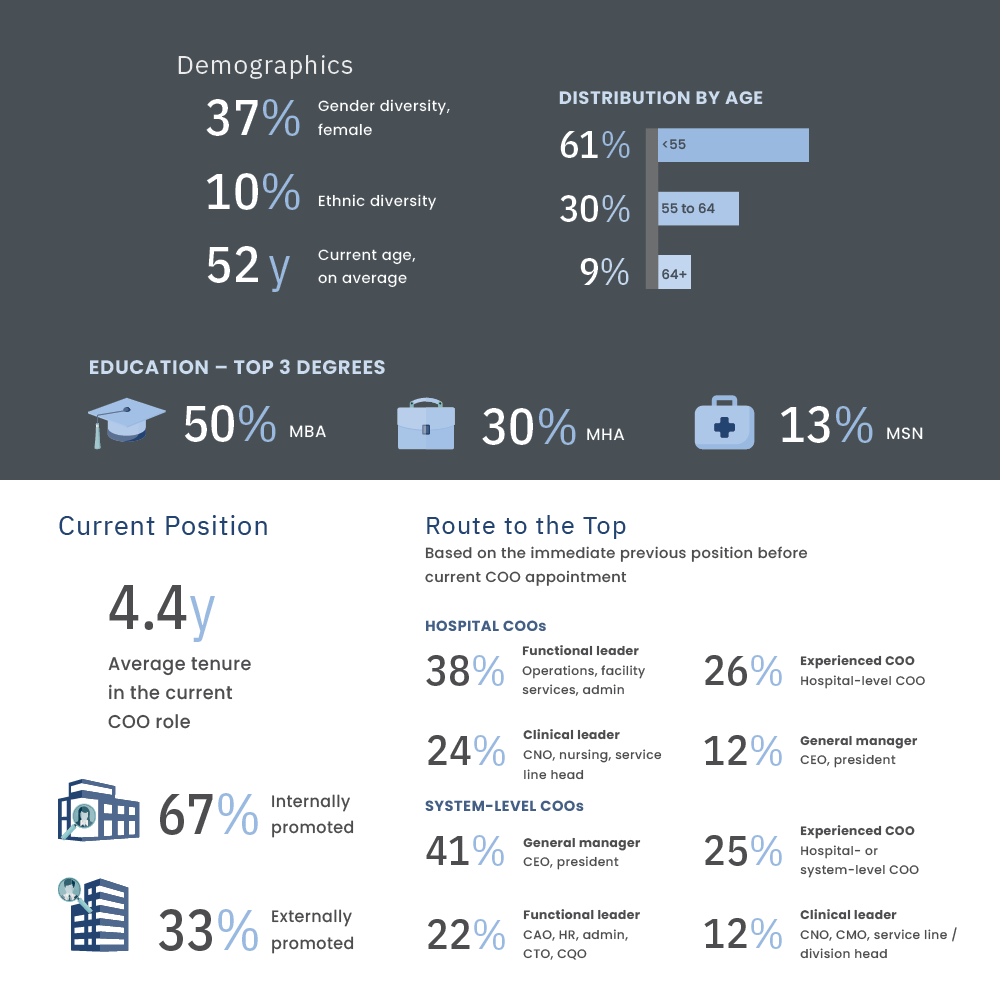
About WittKieffer
WittKieffer is the premier executive search and leadership advisory firm developing impactful leadership teams for organizations that improve quality of life. We work exclusively with organizations in healthcare, science, and education — the Quality of Life Ecosystem — and provide essential knowledge, analysis, and perspective that produce effective leaders and inclusive cultures. Through our executive search, interim leadership, and leadership advisory solutions, we strengthen organizations that make the world better. WittKieffer is proud to be 100 percent employee-owned.
We partner with healthcare organizations across the entire spectrum of systems, facilities, providers, and payors in both nonprofit and commercial healthcare. In the last five years, we have facilitated 1,750 search assignments for a broad range of top positions in healthcare. Over our 56-year history, we have placed nearly 2,800 successful healthcare CEOs — averaging one CEO placement every week. We build impactful leadership at the board and executive team level through succession, executive onboarding and development, acquisition integration, and alignment. Our interim and on-demand services provide strategic leadership solutions that drive results and close critical expertise gaps. Our immersion in the healthcare market has given us an unparalleled depth of understanding and insight into its unique challenges, joys, and opportunities; we remain committed to connecting, developing, and supporting visionary leaders with organizations that share our mission.
With thanks to:
Vizient, Inc.
We Help Healthcare Leaders Improve.
vizientinc.com
Vizient Member Networks.
Your Roadmap for Top Performance.
vizientinc.com/who-we-serve/our-networks
